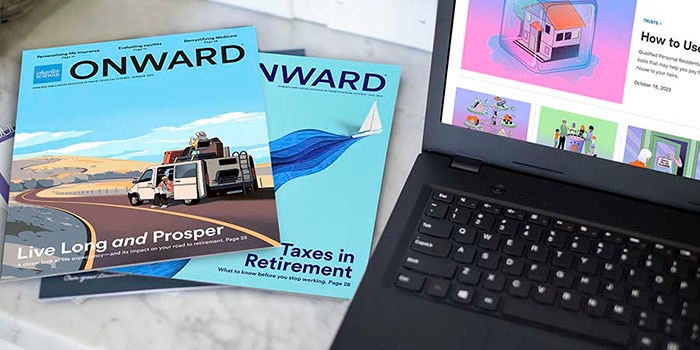
Annuities—insurance contracts that pay you income for either a predetermined length of time or for life—are one way to leverage a sudden influx of cash, such as a bonus or an inheritance. That's because, unlike traditional tax-advantaged retirement accounts, annuities have no contribution or income limits, though they still allow your money to potentially grow tax-deferred until you begin receiving distributions.
However, those who find they don't actually need such income when they reach retirement may be able to use their annuity to transfer wealth to heirs, support philanthropic endeavors, and save on taxes. (Annuities have associated costs, such as commissions, which can vary.)
Here are five ways to put an existing annuity to use in your estate plan—depending on whether you're in the accumulation phase or the payout phase.
Accumulation phase
For deferred annuities, the accumulation phase is the time during which your contributions add to your annuity's value and potentially grow tax-deferred. Depending on how close you are to reaching your contract's maturity date—when payouts can begin and earnings become taxable—there may be several options for your annuity that better meet your current needs, such as:
- Surrender it for a lump sum: You may be able to cash out your annuity if you've reached the end of its surrender period—the time frame during which you cannot withdraw the funds without paying a hefty charge of as much as 20% of the contract value, plus an additional 10% penalty if you're younger than age 59½. However, even if you're still within your surrender period, your annuity may allow annual withdrawals up to a certain percentage without being subject to a surrender charge.
- Transfer ownership to a trust: If you're certain you won't need the money at any point in the future, you may be able to transfer ownership of the contract to a nongrantor irrevocable trust, which removes the current value and all future appreciation from your estate. You will still be the annuitant—the person whose life expectancy is used to determine payouts—but the trust becomes both the owner and the recipient of payouts. Upon your death, the trust receives the remaining death benefit, and the trust's beneficiaries—your heirs—receive payouts according to the terms of the trust.
For either of these strategies, be aware they can be considered a withdrawal and may create a large taxable event. It's critical to scrutinize your annuity contract and consult a tax professional before implementing any changes.
Payout phase
Once the contract begins making payments—known as annuitization—it becomes irrevocable, and you typically can't change its terms. However, you can still use the payouts to further your estate-planning goals. For example, you could:
- Make annual gifts to heirs: If estate taxes are a concern, you could use your annuity distributions to make yearly gifts to your children, grandchildren, and/or other heirs, up to the annual gift tax exclusion of $17,000 per recipient ($34,000 for a married couple) in 2023. You'll still owe taxes on the distributions, but they won't become part of your taxable estate and the gifts won't eat into your lifetime estate tax exemption ($12.92 million per person in 2023).
- Purchase life insurance: Most annuities have death benefits that will pay out to your named beneficiaries upon your death, though such payouts may be subject to ordinary income tax rates. To potentially increase the amount your heirs inherit, you could use your annuity payouts to cover the premium payments on a permanent life insurance policy, assuming you qualify. (Individuals over 70 or in poor health may be denied coverage.) Proceeds from a life insurance policy do count as part of your taxable estate (unless placed in a specialized trust; see schwab.com/ILIT) but generally are tax-free for your heirs.
- Give to charity: Donating your annuity payments to a charitable organization can reduce your taxable income in the year of the donation, assuming you itemize. (The annual tax deduction for cash gifts to public charities is limited to 60% of your adjusted gross income.) Donating the payouts excludes them from your estate as well. You could also open a donor-advised fund account, which allows you to invest contributions for potential growth and establish a legacy of giving among future generations.
Mix and match
Depending on your situation, you may find that employing several of these strategies could help you further your estate-planning goals. Whatever you decide, be sure to discuss your needs with a qualified estate-planning attorney and tax advisor in order to make the most of the excess funds.
Discover more from Onward

Keep reading the latest issue online or view the print edition.
The information provided here is for general informational purposes only and should not be considered an individualized recommendation or personalized investment advice. The investment strategies mentioned here may not be suitable for everyone. Each investor needs to review an investment strategy for his or her own particular situation before making any investment decision.
All expressions of opinion are subject to change without notice in reaction to shifting market conditions. Data contained herein from third-party providers is obtained from what are considered reliable sources. However, its accuracy, completeness, or reliability cannot be guaranteed.
Examples provided are for illustrative purposes only and not intended to be reflective of results you can expect to achieve.
This information is for educational purposes only and is not intended to be a substitute for specific individualized tax, legal, or investment planning advice. Where specific advice is necessary or appropriate, you should consult with a qualified tax advisor, CPA, Financial Planner, or Investment Manager.
Annuity guarantees are subject to the financial strength and claims-paying ability of the issuing insurance company.
Please consider surrender charges that may apply upon terminating an annuity contract.
Please note that annuity withdrawals are taxed as current income, not capital gains. This may or may not be beneficial, depending on your tax bracket. Please consult a tax or accounting professional.
Charles Schwab & Co., Inc. distributes certain life insurance and variable annuity contracts that are issued by non-affiliated insurance companies. Not all products are available in all states.
1123-3TMA

